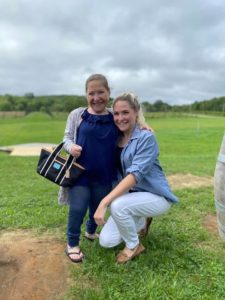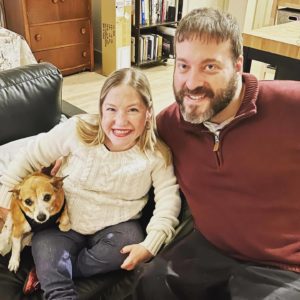In Part 1 of “With Mais and Mal,” Patient Worthy spoke with Mallory Cyr about microvillus inclusion disease (MID), Mallory’s story, and the process of becoming an advocate. Today, we dig deeper into her and Maisy’s podcasting journey and what they hope to show others about life with a rare disease.
“With Mais and Mal”
Of course, this process is part of what has made Mallory so passionate about making a change within the rare disease and chronic illness realm. She explains that not only does the medical industry have to change their understanding of rare diseases and fund research, but that we all need to change the narrative:
There is life beyond a cure.
To Mallory, this is often written out of the conversation when it comes to people with rare diseases. She says that it can be extremely difficult, especially for parents who are searching for a cure for their children. She says:
While you’re doing this research and looking for a cure, you don’t want to miss your child living life. The risk is scary, thinking about what could happen. Your child could die at age 2 or they could live to be in their 40s or 50s. If you only focus on the fix, you’re going to miss what’s happening in front of you.
This is part of Mallory’s mission—to empower families, show both sides, and motivate families to see what is possible. During the pandemic, she frequently discussed these ideas with Maisy. They spent a lot of time over Facetime and, through their talks, realized that items like the future, reproductive health, and “what it looks like to be someone living with this disease without wanting to fix it” are left out of the narrative during conferences and events.

Inspired by the communal move towards podcasting, and empowered by their own experiences, Mallory and Maisy decided it was time to make a change.
And thus, “With Mais and Mal” was born.
The Podcasting Journey
Of course, there are obstacles involved with starting any new endeavor; for Maisy and Mallory, it was no different. First, how could they come up with topics? As Mallory explains:
A lot of my advocacy has been tied to my work. I’ve participated in state government programs and spoken at transition conferences for young people with disabilities. Between my experiences and these events, we’ve noticed gaps. For example, people have been begging to learn more about how to navigate relationships with a rare disease diagnosis. I often see these workshops for young people facilitated by others who are not in relationships. It’s not easy. Relationships aren’t easy with or without a rare disease, and there’s a lot to think about like communication and insurance. These things are possible and we want to show people how we’ve navigated them.

So far, one of Mallory’s favorite episode topics related to identity, community, and the impact of social media while navigating a rare disease or chronic illness. In the March 15 episode, “Tubies, and Spoonies, And Zebras. Oh My!” which you can listen to here, the sisters dug into the topic of finding community, how to seek support online and social media toxicity. Although Mallory acknowledges that this episode felt a little controversial she says:
We wanted to push the envelope. We wanted people to know that things can change since we were growing up without social media. This topic totally resonated with people and we got a lot of amazing feedback. It was really powerful to process.
Future Topics
In future episodes, “With Mais and Mal” aims to cover more about:
- How the sisters have navigated life with different medical devices
- Employment and how to advocate within employment settings, as both sisters work full-time
- What it is like attending college (or grad school!) with a rare disease or chronic illness
- In some of the earlier podcast episodes from 2020, Maisy and Mallory both discuss the college process, including accommodations and advocacy. Maisy shared her experience studying abroad (and how Italy and Ireland were her favorite spots)!
- Advocating for accessible housing, transportation, and healthcare
- When Mallory moved to Boston for grad school, she and her husband navigated and managed this landscape, so she hopes to share how they did and everything that went into moving to a new city (and all the adversity they faced during that time).
No matter what they cover or where the podcast takes them, Mallory makes one thing clear: the podcast aims to show people that having a rare disease doesn’t mean fitting into a box. There are a lot of elements, symptoms, or experiences that many people deal with—and this platform gives “With Mais and Mal” the chance to let people know that their experiences, while variable, still matter.
Timing and emotions are another difficult part of the journey. Currently, Mallory handles writing the scripts and ensuring that they flow well, while Maisy works more on the producing and technical side. However, between work, grad school, internships, family, friends, and everything in between, it can be hard to ensure consistency! Additionally, says Mallory:
It can be intense reliving some of those emotions, so we have to be in the right headspace, but we have so much fun doing it. Since we don’t live in the same area, it’s been hard being away from each other. This gives us an opportunity to connect through our lived experience. It’s funny to see what Maisy remembers vs. what I remember, and exploring topics that don’t get a lot of air time because of fear or just a lack of opportunity.
Currently, you can find “With Mais and Mal” on Apple Podcasts, Amazon Music, Spotify, Podbean, and more. To learn more about “With Mais and Mal,” and to catch up on the amazing available episodes, head over to the “With Mais and Mal” website.
Looking Towards the Future
Mallory and Maisy hope to continue growing and nurturing “With Mais and Mal” in the future, transforming their passion project into an avenue for support, communication, and change.
Outside of “With Mais and Mal,” though, Mallory does have some ideas on how to continue innovating change within the rare disease space. She spoke at the Global Genes Summit in September, and looks to continue speaking at other conferences in the future. For her, it is most important to get in front of medical providers:
We have to move beyond the same groups of advocates talking to each other, and those who already know what the problems are. We need to get in front of the people with the power to change the systems and infuse our narrative with people who make decisions. We need to empower and train patients to explain their lived experience beyond the inspirational story and help advise systems change. So many healthcare emergencies and challenges could be prevented if providers listened to patients.
In particular, she would love to get in front of pharmacists at the National Home Infusion Association (NHIA) Annual Conference and speak to disability culture and person-centered medicine. She explains:
I want to be in the big pharma conversation and hospital admin discussions. There is power within advocacy, but if we’re all fighting the same fight and singing the same song, we need to be in the spot to change systems. I’m not afraid to comment and ask how there will be inclusion, but there has to be buy-in from the top.
Outside of speaking, Mallory hopes to one day write a book. She is also currently designing a class for the BU School of Public Health to include disability equity in the existing public health curriculums:
It has to be present in medicine, public health, social work, and any other fields creating the next generation of professionals.


